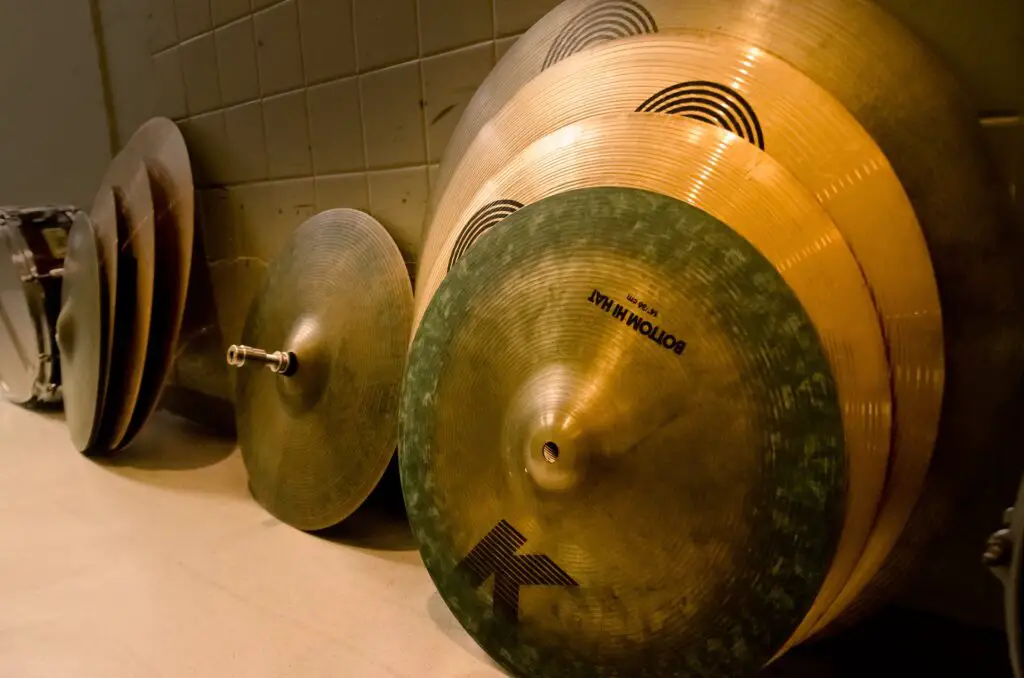All drummers know that your cymbals are an incredibly important piece of your kit. This means that when you invest in a new cymbal, you might wonder if your cymbal will wear out.
Knowing what to expect in terms of the sound and appearance of your cymbal over time, as well as some issues like cracking you might come across, is essential to preparing for this and possibly trying to mitigate these effects.
Cymbals can alter in their sound and appearance over time which some people may describe as them ‘wearing out’. Over time, cymbals could become trashier sounding and produce darker sounds and possibly be more likely to crack. However, some drummers have a preference for more aged cymbals.
So, you might now be wondering how exactly the sound and appearance of your cymbal will wear and change over time and if this is the right sound for you. You might also want to know more about how age could affect how likely your cymbal is to crack. If so, keep reading for everything you need to know!
In the article you will find out:
- What some of the terminology relating to cymbal sound means
- What happens to cymbal appearance and sound over time
- Cymbal cracking
- Tips for buying used cymbals
Cymbal Terminology Guide
Before we look at how ageing can affect the sound of your cymbal and contribute to it becoming ‘worn out’, it can first be useful to understand what we mean by some of the terminology usually used to describe cymbal sounds.
I know when I was brand new to drumming, I barely understood a lot of the terminology I was ready which made it tricky to understand exactly what certain cymbals would sound like.
So, we’ve put together this handy quick guide to some of the terminology it might be useful to know when talking about cymbal sounds! This isn’t by any means a conclusive list as there is plenty of ways to describe different types of sounds, but these are just a few that you might come across in this article!
Dark sounds:
Darker sounds produced by cymbals can be described as lower in frequency. These sounds can also be more ‘complex’ and less ‘bright’ sounding than light sounds.
Light sounds:
Lighter sounds produced by a cymbal can be described as higher in frequency, which produce a ‘brighter’ sound.
Sustain:
The amount of time after the cymbal has been struck that the sound of it can still be heard. Sustain is affected by age, type, size and thickness of the cymbal.
Trashiness:
This refers to when a cymbal sounds less ‘clean’ or ‘pure’ sounding. The cymbal may sound more aggressive and complex.
What Happens to Cymbals with Age?
Any drummer will notice that as time goes on and with frequent playing, some cymbals can undergo certain changes. These changes can be to their appearance and sound because of a variety of factors.
Some drummers prefer the sound produced by an ‘aged’ cymbal and actively seek cymbals with these qualities. This will depend on the type of music you want to play and if a darker sounding cymbal with more sustain will suit this, but this is all down to personal preference.
Appearance
With age and wear and tear, you might also notice a change in the appearance of your cymbal as well as its sound. These often come hand in hand, making it relatively easy to see how aged a cymbal is and therefore predict its sound.
In general, cymbals that are older and more worn will have a duller appearance. This means they will not shine and can be darker in colouration too.
Brand new cymbals which are designed to be bright generally have a shiny and polished appearance. This bright, light look matches the sound they produce.
Of course, there are some exceptions to this rule, particularly with cymbals which could be brand new, but are designed to have a duller appearance and even perform more like an aged cymbal.
This means that if you like the appearance and sound produced by an aged cymbal, you can often buy one without having to wait for an existing one to age!

Sound
Over time and with oxidation and some dirt build up on the cymbal surface, you will often also notice certain changes to the sound the cymbal produces.
I particular, you may notice a change away from the bright, light sound that brand new, polished cymbals often produce. Instead, an aged cymbal may produce a darker sound which is also more complex and trashier compared to new, polished cymbals.
Additionally, aged cymbals often have a longer sustain than brand new cymbals, meaning the sound of the cymbal can be heard for a longer time after it has been struck.
Cymbal Breaking
Another thing to consider about your cymbal’s performance over time is the possibility that it could become damaged or cracked.
This becomes more likely the older the cymbal gets, simply because over time your cymbal will go through lots of wear and tear if you use it a lot, which can slowly wear down and weaken the material.
Why are Cymbals More Likely to Break with Age?
With time and depending on how frequently you use the cymbal, general wear and tear can affect your cymbal.
This is because, when the cymbal is struck with a drumstick, the material undergoes a certain amount of stress. When this happens repeatedly with frequent playing, particularly with hard strikes to the cymbal, the material may reach a limit where this mechanical stress will lead to cracking.
What can you do to Prevent Cymbal Breaking?
While you might not be able to prevent the general wear and tear that is inevitable when using a cymbal, there are things you can do to reduce the risk of them cracking.
For example, your technique could contribute to how likely your cymbal is to crack. If you strike the cymbal particularly hard and at more of a 90-degree angle, more stress is being applied to the material and may be less able to distribute evenly across the whole cymbal surface if striking to rim.
This means that more stress is applied to a small, precise location which will wear down the structural integrity of this area quicker.
Therefore, striking the cymbal slightly lighter as well as setting up your cymbal so that it is slightly tilted towards you could help to cause less stress to the cymbal and possibly reduce the chances of cracks forming. Remember, speak to a professional drum teacher for advice on the best technique and setup to use to reduce the chances of damage to your cymbal.
The type of cymbal you use can also affect how likely your cymbal is to crack. For example, thicker cymbals are generally thought to be more robust and so more resistant to damage by strikes over time.
Cymbals that feature holes in them, such as effects cymbals, could be slightly more at risk of cracking than those without. This is often due to simple mistakes like the drumstick becoming caught within one of these holes and causing damage when playing.
Buying Second-Hand Cymbals
If you are looking to buy a second-hand cymbal, then determining the cymbal’s age and level of wear and tear is essential.
It is always a good idea to ask the age of the cymbal, as well as how frequently it has been played over time in order to get a better idea of its condition.
You can also look at the cymbal for small signs of cracking. In particular, these are most likely to appear at the edges of the cymbal or the edges of any holes.
The sound and appearance of the cymbal can also hint at how ‘aged’ it is. For example, if it produces darker sounds and is duller in appearance compared to brand new cymbals of the same type and thickness, it may have undergone ageing.
Conclusion
To conclude, cymbals alter in their sound and appearance over time due to oxidation and general wear and tear. This can lead to the cymbal producing a ‘darker’ and ‘trashier’ sound with a longer sustain compared to brand new, polished cymbals.
Age can also increase the risk that your cymbal could crack because of the stress it is put under with frequent playing.
The risk of cymbals cracking also depends on the type and thickness of the cymbal, as well as your technique. Ask a professional drum teacher for advice on how to adapt your technique to reduce damage to your cymbals.
When looking to buy new cymbals, it is important to look at their age, their condition and any signs of damage to predict how long the cymbal may last.
If you found this blog useful, check out our other posts about all things drumming! We try to give advice on getting the most out of your drum kit, as well as some of the most frequently asked questions new drummers might have!

